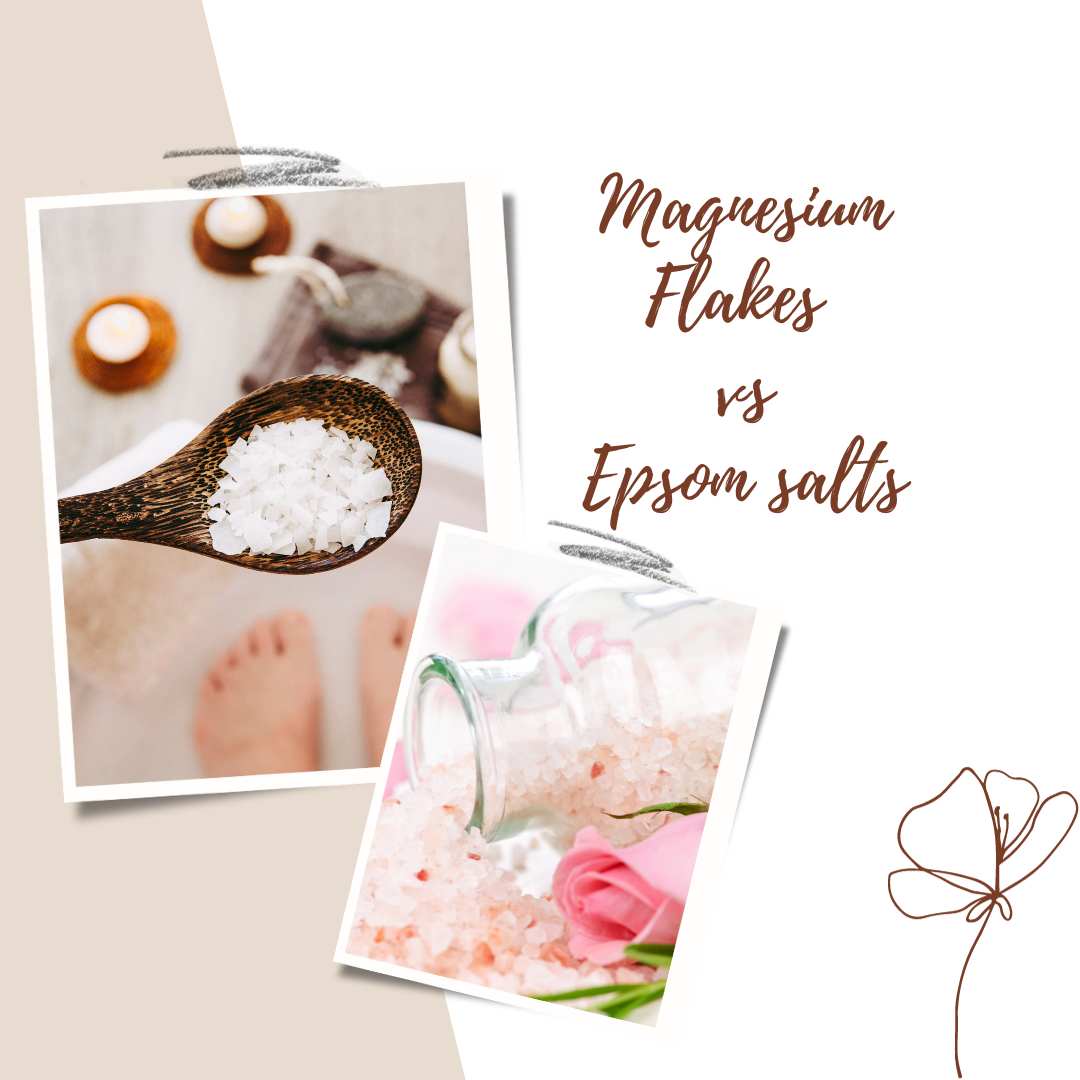Magnesium flakes vs epsom salts-the difference and benefits
In ancient times, the Dead Sea was a sought-after destination for those seeking relief from various ailments. Its reputation stems from its rich mineral content, believed to hold a multitude of health and cosmetic advantages.
There is nothing better than easing yourself into a hot water bath (in your spa-like bathroom) after a stressful day or a long hike. The scent of fragrant bath oils or soothing bath salts fills the air, creating a sensory oasis. The benefits of this type of soak offers much more than relaxation.

Epsom Salts Vs Magnesium Flakes
Both Epsom salts and magnesium salts have become popular choices for bath soaks. The mineral (magnesium sulfate) and magnesium chloride flakes, are known for their potential to elevate magnesium levels in the body. This plays a crucial role in various biochemical functions.
So how similar are they? Epsom Salts are often more budget-friendly. However, the main distinction is that Epsom Salts are actually Magnesium Sulfate, while Magnesium Flakes are Magnesium Chloride.
In this blog post, we will delve into the magic of magnesium and the differences and benefits between magnesium flakes and epsom salt.
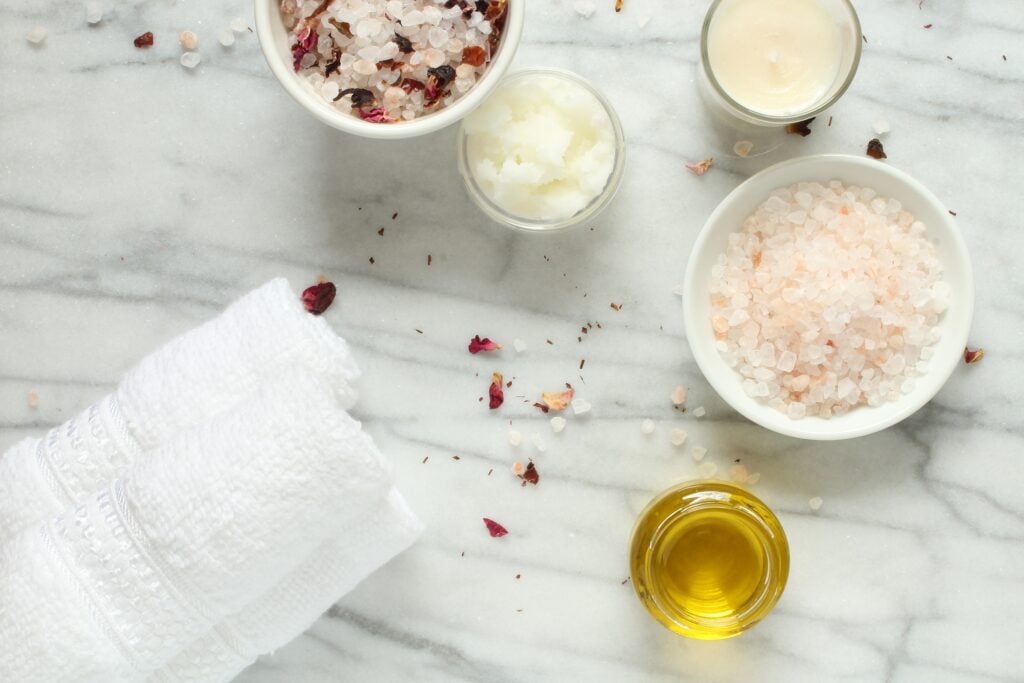
What Is The Difference Between Epsom Salt and Magnesium Chloride Flakes?
Key Difference Is the Chemical Composition
The main difference between Epsom salts and magnesium chloride flakes lies in their chemical composition. Epsom salts are composed of magnesium sulfate (magnesium and sulfate ions). Magnesium chloride flakes consist of magnesium and chloride ions.
a. Transdermal Absorption
Epsom salt baths are a popular choice for those seeking relief from muscle soreness, tension, and various skin conditions. The sulfate ions in Epsom salts are believed to support transdermal absorption.
This allows magnesium to enter the body through the skin. This method of absorption can be a great way to replenish magnesium levels, as some individuals may be magnesium deficient.
b. Magnesium Chloride Flakes For Better Absorption
On the other hand, magnesium chloride flakes are gaining attention as a better option for bath soaks. The chloride ions in magnesium chloride flakes are thought to enhance the absorption of magnesium. This offers significant benefits compared to Epsom salts.
C. New vs. Ancient Bath Salts
Epsom salt baths have been used for centuries and are a familiar choice. Magnesium chloride flakes are a comparatively new commercial bath salt.
The molecular structure of magnesium chloride allows for better transdermal absorption. This means potentially making it a more effective remedy for those with magnesium deficiencies or other health issues.
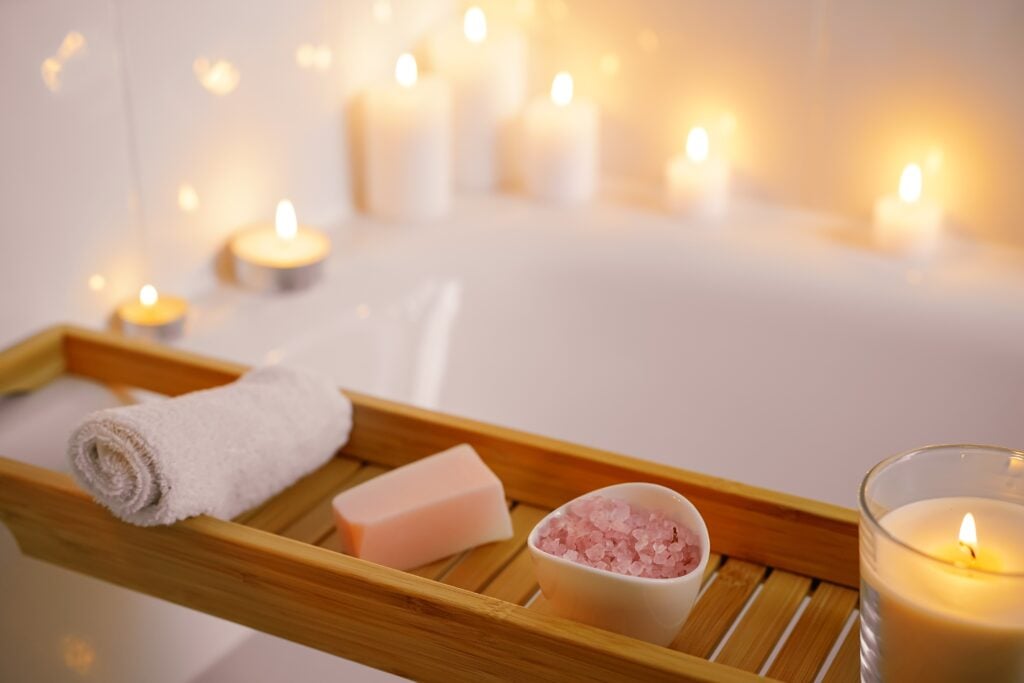
In addition magnesium supplements are available for those who prefer oral intake. However, magnesium absorbed through the skin in bath soaks offers a different route for magnesium replenishment. The benefit is that there is not as much risk of digestive issues that can occur with oral supplements.
Which One Is Better For Baths?
Ultimately, the choice between Epsom salt and magnesium flakes depends on your specific goals. If you’re primarily looking for muscle relaxation, general relaxation, and affordability, Epsom salt may be a suitable choice.
However, if you are seeking a form of of bath salt that provides better transdermal absorption, magnesium is a good choice. The benefits for skin health, or offers a more intense relaxation experience, magnesium flakes could be the better option.
It’s essential to consider your personal needs and any specific health concerns, and consult with a healthcare professional if you have questions about magnesium supplementation or its use in your wellness routine.
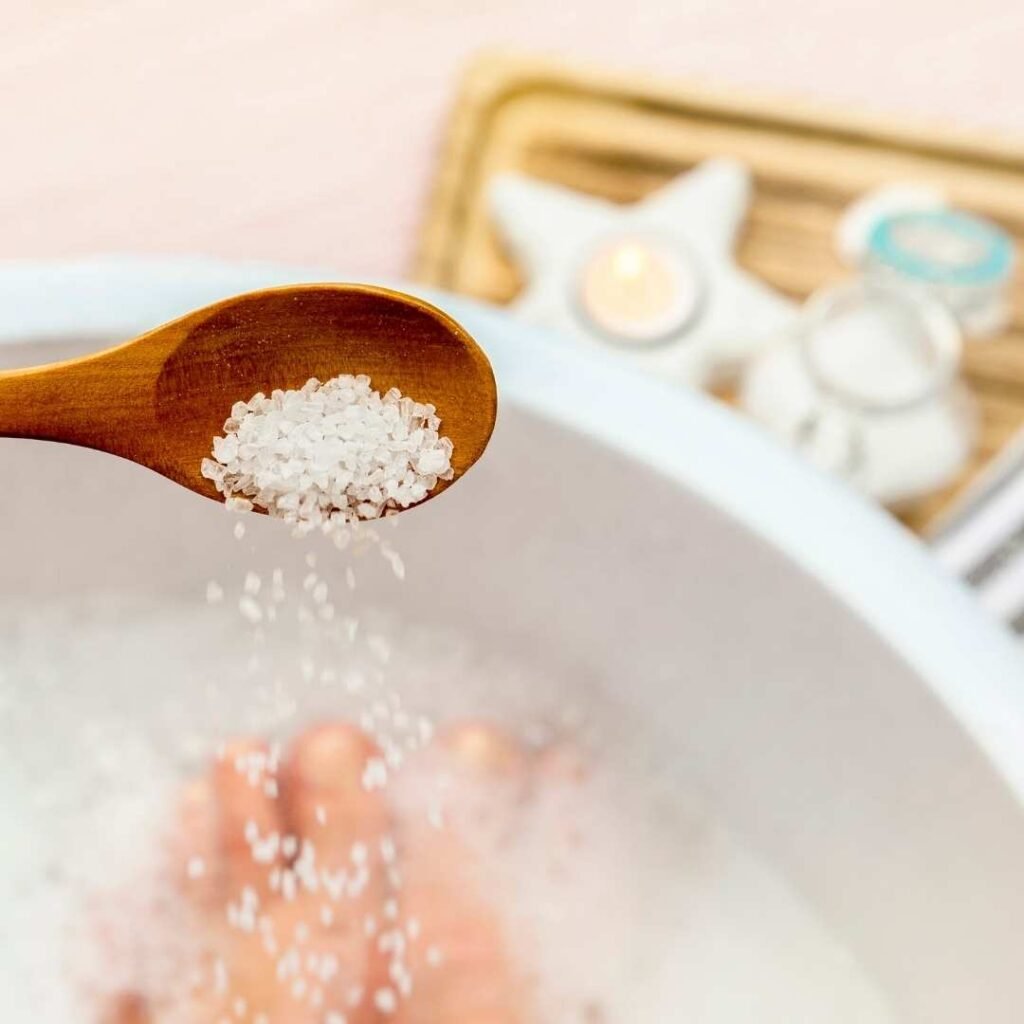
The Magic Of Bath Salts
What Is Magnesium Chloride?
In a nutshell, Magnesium Chloride, in the form of Magnesium Flakes. It offers a range of health benefits that are best harnessed when absorbed through the skin.
Whether you’re looking to ease muscle cramps, unwind from stress, or pamper your skin, a warm bath with Magnesium Chloride can do the trick! Nothing beats a luxurious and health-enhancing bath experience.
Well, it’s got a host of benefits. From helping manage cramps, migraines, and stress to promoting a deep and restful night’s sleep, it’s a versatile mineral. Interestingly, even though it’s often called a “salt,” Magnesium Chloride can be quite hydrating for the body, making it a nourishing choice for those with sensitive or dry skin.

The Magic Of Magnesium Chloride
The true magic of Magnesium Chloride lies in its ability to be absorbed through the skin. You can also take magnesium supplements orally. The only issue is that the effectiveness can be reduced when they come into contact with stomach acids and digestive enzymes, depending on the specific formulation.
Magnesium chloride is like a special type of salt made up of two things: magnesium and chloride. We need magnesium because it helps our body do lots of important jobs. Such as making our muscles work, helping our nerves send messages, and keeping our bones healthy.
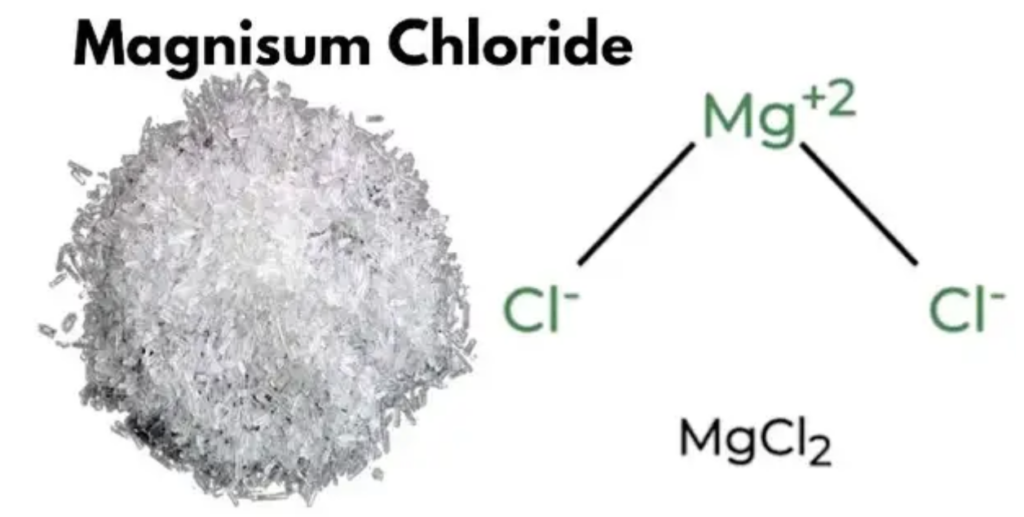
People use magnesium chloride in a few different ways. Some take it as a supplement, like a vitamin, to make sure they have enough magnesium in their bodies. Others use it on their skin in things like baths or oils because it can get into our bodies through our skin.
So, in simple terms, magnesium chloride is a type of salt that can be helpful for our bodies and our health in different ways, from the inside out. But it’s always a good idea to talk to a doctor if you’re thinking about using it for your health.
What Is Magnesium Sulfate?
Magnesium sulfate is a chemical compound made up of magnesium, sulfur, and oxygen.
Magnesium sulfate, sold as Epsom salt, is a mineral compound that’s used for different health and medical purposes. Epsom salt gets its name from a natural spring in Epsom, England, where it was first discovered.
Let’s dive into the differences between Epsom Salt and Magnesium Chloride Flakes. They may look quite similar at first glance, but they serve different purposes. One of the key distinctions lies in how our bodies absorb them.
Absorption Via Magnesium Flakes
The molecular structure of Magnesium Chloride makes it much more easily absorbed than that of Epsom Salt. As a result, I’ve found that Magnesium Chloride tends to have more pronounced effects. It’s important to note that, unlike Epsom Salts, Magnesium Chloride isn’t typically recommended for ingestion, unless it’s specifically labeled as food-grade.
Magnesium sulfate is commonly used for various purposes. This includes natural remedies for muscle aches and pains. Salt baths help with relaxation, and a laxative for relieving constipation. It’s also used in agriculture to provide essential nutrients to plants.
In addition, magnesium is used for medical treatments. This includes the management of certain heart conditions or as a component of intravenous (IV) solutions.
Now, when it comes to enjoying a relaxing bath with Magnesium, you might wonder about the differences between Epsom Salts and Magnesium Flakes.
Benefits of A Epsom Salt and Magnesium Flake Bath
The epidermis, your body’s largest organ, deserves some care, even if you usually prefer showers. Occasional baths can be a perfect way to pamper this vital organ.
Immersing yourself in a bath infused with magnesium flakes or epson salts can offer lots of advantages for your skin. In addition it is key for your overall health and well-being. When you take a magnesium salt baths, you can experience the following benefits:
- Promote Relaxation
- Alleviate Joint Discomfort
- Reduce Inflammation
- Calm Skin Conditions such as eczema or acne
- Relieve Fatigue
- Eliminate Toxins at a Cellular Level
- Enhance Blood Flow
- Improve Sleep Quality
- Skin Hydration
- Energy production and maintaining electrolyte balance
- Heal Sore muscles and relief from muscle aches, cramps and tension
- Helps PMS- PMS symptoms such as cramps can be reduced with a magnesium bath.
Why We Need Magnesium
Imagine magnesium as a special worker in your body that helps everything run smoothly. This worker helps your muscles move, your nerves talk to each other, and your bones stay strong. Now, if you don’t have enough of this worker (magnesium), things can go a bit haywire.
When you’re low on magnesium, it can lead to what we call “magnesium deficiency.” This can cause problems like muscle cramps, feeling extra tired, or even heart issues. It’s a bit like trying to drive a car without enough fuel; it just won’t work well.
That’s why it’s important to make sure you have enough magnesium in your body. You can get it from eating certain foods like nuts, seeds, and green veggies. Sometimes, people also take magnesium supplements to top up their magnesium levels. When your magnesium worker is doing its job, you’ll feel better, have more energy, and keep your body running smoothly.
What are the different forms of magnesium?
- Magnesium Citrate: This form is commonly used as a dietary supplement. It’s well-absorbed and often recommended to help with constipation or as a general magnesium supplement.
- Magnesium Oxide: Often used as a laxative or antacid, magnesium oxide is not as well-absorbed as other forms and can have a mild laxative effect.
- Magnesium Chloride: Magnesium chloride can be found in supplements, but it’s also used in transdermal applications like magnesium bath flakes or magnesium oil, which are absorbed through the skin.
- Magnesium Sulfate: Also known as Epsom salt, magnesium sulfate is used for baths and foot soaks, known for its muscle-relaxing and soothing properties.
- Magnesium L-Threonate: This form is gaining attention for its potential cognitive benefits, as it may be better at crossing the blood-brain barrier.
- Magnesium Glycinate: Magnesium glycinate is often used as a supplement and is considered a highly absorbable form. It’s known for causing less gastrointestinal upset compared to other forms.
- Magnesium Malate: Used for supplementation, magnesium malate may be beneficial for people experiencing muscle pain and fatigue.
- Magnesium Taurate: This form combines magnesium with the amino acid taurine, making it potentially useful for heart health and managing blood pressure.
- Magnesium Carbonate: Sometimes used as an antacid to relieve heartburn or indigestion.
- Magnesium Aspartate: This form combines magnesium with aspartic acid and is used in supplements for its potential benefits on athletic performance and muscle function.
Each form of magnesium has specific properties and potential benefits, making them suitable for different health needs and preferences. The choice of which form to use often depends on the intended use, whether it’s for muscle relaxation, overall health support, improving sleep, or addressing specific health concerns.
It’s important to consult with a healthcare professional when considering magnesium supplementation to determine the most appropriate form for your individual needs.
The Wrap Up
In the ongoing quest to manage muscle pain, enhance skin health, and support overall well-being, Epsom salts and magnesium chloride flakes have become go-to options for many. While both have their unique benefits, magnesium chloride flakes are emerging as a promising alternative due to their potential for better transdermal absorption.
Ultimately, the choice between these two forms of magnesium comes down to individual preferences and needs.
A magnesium-enriched bath, in any form, is a good idea for anyone looking to relax and boost their magnesium levels naturally. Be sure to consult with a healthcare professional if you have sensitive skin, allergies, or any health concerns before incorporating magnesium baths into your self-care routine.

